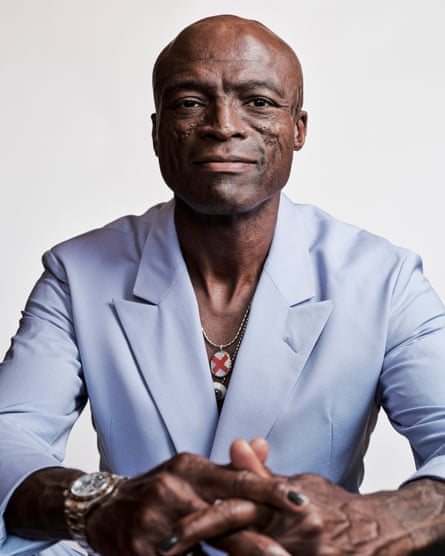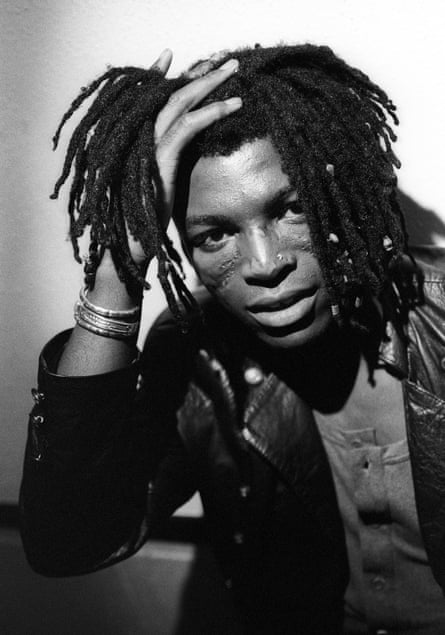On his 60th birthday earlier this year, Seal thought he had died. Opening the door to a friend’s house, the singer was confronted by 200 people from every aspect of his life – his old manager Rob Cavallo, who he hadn’t seen for 18 years, his sister, children, housekeeper and even the tennis coaches he had hired to lead a boot camp years previously. “They say that when you die you will see all the people who love you,” he says, “and for a split second, that’s where I thought I was.”
He came to from the shock and swiftly had another realisation. “There was only one reason they were all at this party, these people that I was really fond of and people I thought I was more fond of than they were of me; it’s because they love me and they cared enough to make the effort. It was a rare moment where I faced the reality that I am worthy of being loved. And that was just too much – it was really overwhelming.” He spent much of the rest of that night crying.
If there is one thing you should know about Seal, real name Seal Henry Olusegun Olumide Adeola Samuel, it is that he loves love. Over the course of our 45-minute conversation, he says the word 36 times. Since the release of his eponymous 1991 debut album, he has sold more than 20m records thanks to the soaring, huskily soulful vocals that expound on every aspect of the romantic condition. There is the addictive infatuation of Kiss from a Rose (1995), the need for a unifying, human connection on Killer (1991) and the nourishing, healing importance of love itself on, you guessed it, 2015’s Love.

“What else is there to sing about?” he says in his signature baritone, still with the twang of his London upbringing even though he has lived in the US for the best part of 20 years. “No one wants to hear me singing about the woes of the world or about how depressed I have been. It has to circle back to love. It is at the centre of everything I do.”
It is a tactic that has paid off for Seal, who is holed up in a Malibu studio working on new material, on a short break from his world tour celebrating three decades since the release of his first two albums. During our video call he is also trying to eat breakfast while battling an ant infestation across his desk. There is clearly a lot going on, yet for Seal there are always bigger things at stake, such as homing in on the inspiration for his next songs.
“Whenever I think back on all the records that I have made, the value has been in the process, not in the end result,” he says. “I don’t really care what happens to it afterwards because it is out of your hands. It is about the incredible moments where you are in a room with your favourite players and they do something that is magical, then you harness that energy for the record.”
He talks excitedly about a new song the band has been working on that explores the idea of home and how it is a feeling you carry with you, as much as a place that you return to. It’s a poignant subject for Seal to explore.
Born to a Nigerian mother and Brazilian father in London, he was raised by a foster family in Essex until he was four. When he returned to his biological family, Seal had to share a home with his physically abusive father. By the time he was 15, he had run away; he spent the ensuing years couch-surfing with friends or sleeping in homeless hostels while he took a grant to go to college.

It is touching, I comment, that he has dedicated his life and career to the healing power of love when his childhood and teenage years seem so marked by a difficulty in accessing it. “Much has been made, perhaps through my own fault, about my ‘difficult’ upbringing,” he says, putting air-quotes around the word “difficult”. “But it wasn’t that difficult. In retrospect, I was extremely fortunate. It was a bit of a patchwork family and I could have done with a father that wasn’t that abusive or violent, but as soon as I was 15, I escaped. He gave me one beating too many and I was out the door living it large in London, becoming an adult.”
The more we speak, the more he shows his resilience and his remarkable capacity to find good in the hardest of times. “I had the benefit of foster parents who loved me for those formative years of my life,” he continues. “I slept on friend’s floors, I slept in homeless shelters and there were at least those facilities for me to take advantage of. In fact, I currently work with an [adoption and social care] charity called Vista Del Mar and when you look at some of the kids in those places, they have fuck all. They are told that they are insignificant and they’ve been completely and utterly abandoned. That’s a real difficult childhood. Mine was nothing like that.”
He speaks enthusiastically about Mr Wren, a primary school teacher who first encouraged him to sing and gave him his earliest opportunity to perform in front of his parents at a school concert aged 11. “He dressed cool, looked cool and he took an interest in me. I started singing because he sang and I wanted to be like him,” Seal says. “Throughout that ‘difficult’ time in my childhood, he was there and he saw me when few other people did. He took the time to inspire me, to push me.”
After that a cappella school hall performance of Johnny Nash’s standard I Can See Clearly Now, Seal viewed his singing talent largely as a hobby and party trick, rather than a calling. He left home and, after his father’s death when he was 17, he pursued a diploma in architecture before briefly considering becoming a fashion designer. It was another chance encounter that nudged him fully into music. “There was a girlfriend I had at the age of 23 who convinced me that I was wasting my time trying to be a fashion designer,” he says. “She heard me sing for the first time and took me straight down to Tottenham Court Road, bought me a drum machine and Portastudio recorder, gave me a clip round the ear and said: get on with it, stop wasting your time. I didn’t want to hear it, but it is one of the most sound pieces of advice I ever had.”

There followed dozens of tentative pub gigs and a stint spent touring in Japan as part of the funk band Push, where Seal began to perfect his onstage vocal skills and status as a captivating frontman. He was “always writing new stuff, since it never switches off”, and after the Push tour ended he stayed on for a year travelling in Asia, playing in a blues band in Bangkok while writing the demos that would eventually make up his multimillion-selling debut album.
Returning to London in 1989 for the birth of the DIY rave scene and the warehouse parties that produced acid house, Seal met the electronic producer Adam Tinley, AKA Adamski, and wrote lyrics to one of his more downtempo backing tracks. The anthemic result, Killer, became a dancefloor and chart hit, spending a month at No 1 in the UK and leading to a record deal with the producer Trevor Horn.
The pair embarked on a long and sometimes tumultuous relationship, ultimately producing six records including the multi-platinum Seal and Seal II. The second featured the power ballad Kiss from a Rose, which became Seal’s entry into the American market after the director Joel Schumacher put it in the end credits for his 1995 film Batman Forever. It reached the top spot on the Billboard Hot 100 and won three Grammys in 1996. Horn has returned as musical director on Seal’s world tour and the rekindled partnership has Seal ruminating on his journey. “I mainly just feel lucky that I was able to sing my way out of poverty and sing my way into people’s favour,” he says. “The last 30 years of my life have been exceptional – I have done things I could have only dreamed about.”
Not that global success hasn’t come with challenges. After meeting the model Heidi Klum at a party in 2004, the pair began dating and soon married. They had three children together, all under constant tabloid scrutiny. There are dozens of articles speculating on their yearly ritual of vow renewals, the reasons for their eventual split in 2012 and even their finances. “It was a pain in the arse,” he says. “I can’t stand the word celebrity because it has such a negative connotation of implying being famous for the sake of being famous. As far as I was concerned, I was always a musician and I have never considered myself a celebrity. I don’t need to look in OK! magazine to understand who I am. I am no longer in that circus.”
Instead, he is focusing on his true calling. That is, of course, to make people “lean in with love”. “When I perform, I sing to remind people to connect with each other because I have a lot of faith in us as a species,” he says. “I think we do some pretty screwed-up things, but at our core we are of love and that is the purpose of life. The fact that I can sing and have that love reciprocated is extremely rare. I do for a living something that, in essence, is who I am.”

To support all this, he spends an hour with his vocal coach every day and is an avid tennis player, using his training sessions to stay physically and mentally fit enough to tour. “Tennis is an allegory for life. A lot of the time, a tennis player is competing against themselves, not the other person,” he says. “You have to work daily on your technique and you have to go through the repetition in order to let go. It’s the same as singing, where technique is only there to prevent the body from interfering with the soul’s free expression. When I walk up to the mic and open my mouth, I’m letting go and trusting that I will be caught by the hours of preparation that I have put in. I am trying to relinquish control.”
All this leaves me wondering one thing: if embodying, giving and receiving love is so central to Seal’s existence, then why was it so shocking to be confronted by so much of it at his 60th birthday party? “It was a teaching moment,” he says, somewhat cryptically. “I have to accept that people are there because they care. If for some reason my time actually was up now, I would not be looking back on my life saying, ‘God, what a waste.’ I would say my first couple of years were a bit rocky but, man oh man, did you make up for it.”
-
Seal’s world tour is under way. For more information visit sealofficial.com
"Love" - Google News
September 05, 2023 at 11:00AM
https://ift.tt/D7se6IO
Seal on homelessness, hits and love: ‘My father gave me one beating too many – and I was out the door’ - The Guardian
"Love" - Google News
https://ift.tt/4pnjwrg
https://ift.tt/CmQwn7t
Bagikan Berita Ini














0 Response to "Seal on homelessness, hits and love: ‘My father gave me one beating too many – and I was out the door’ - The Guardian"
Post a Comment